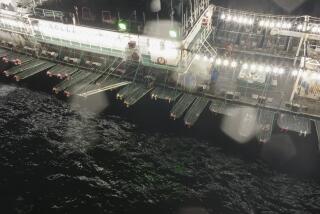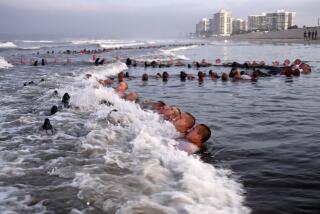No Guarantees Ships’ Doctors Are Well-Trained : Health: There is no law, international or American, that governs medical care for passengers at sea. This loophole allows some lines to get by with coverage that is far less than satisfactory.
- Share via
Public and private agencies are beginning to look more closely at the adequacy of medical services aboard cruise ships.
Passengers may be surprised to learn that there is no international or U.S. law requiring minimum standards of medical care for cruise passengers. In fact, no law even requires that there be a doctor aboard.
Although all large cruise ships do provide some kind of medical service--some good, some poor--this absence of standards has allowed a few companies in the highly competitive market to get by with far less coverage than satisfies U.S. maritime medical experts. This in spite of the fact that 81 of approximately 100 of the world’s large passenger liners regularly sail from U.S. ports such as Miami, Los Angeles and Seattle with mostly American passengers.
Although some of those ships are owned by U.S. companies, all but one of them operate under foreign flags. Together, they carry some 4 million passengers from U.S. ports to the Caribbean, Mexico and other exotic settings each year.
Concerned by instances of sloppy safety and reports of non-credentialed or inadequately trained doctors, broken medical equipment, sick passengers abandoned on islands and questionable medical care, various agencies and groups are demanding tighter controls on ships leaving from U.S. ports, even those of foreign registry. While some lines provide adequate medical care, stories abound of the shortcomings on cruise ships.
On one ship out of Miami, according to a Ft. Lauderdale newspaper which investigated the problem, a doctor was irritated by having to see a patient with chest pains and delayed a consultation until he had dressed in full uniform. The patient died, and the family is suing the cruise line.
The same Florida paper found a “doctor” on one ship who had no license from any country in the world. His only medical experience was taking blood in a blood bank. Another doctor who allegedly gave questionable care, according to court testimony, had previously been fired by the Veterans Administration for the same offense.
Steve Merson, a Baltimore resident who runs a medical 911 emergency service for ships at sea, said he recently studied the physician accreditation, record-keeping, equipment maintenance and drug controls on 12 cruise ships.
“I found doctors who are not allowed to practice in the United States. Some are involved in diploma-mill scandals and some can’t speak good English,” he said.
“Often, they had no concept of emergency medicine. Typically they are reluctant to tell the captain about a problem or to call shore for help.”
On one ship, the cardiac defibrillator--a device used to restart a stopped heart--had been broken for five years. Merson said the medical staff did not know how to perform cardiopulmonary resuscitation and he called their medical records “abysmal.”
A report prepared by Merson cited Cunard, Norwegian Cruise Line, Royal Caribbean Cruise Line and Holland America as lines that provide good medical services.
A reporter’s phone call to the New York-based Cruise Lines International Assn. asking for its policy regarding the qualifications of shipboard medical officers revealed that the association deals only with marketing and consumer education. A spokesman said medical policies are determined on a “line-by-line” basis. The association represents 36 companies.
Calls to two lines that sail to Alaska and Latin America out of West Coast ports provides contrasting impressions. In Los Angeles, a Princess Cruises public relations woman said she would have to fax a reporter’s questions to London, where medical affairs are handled. One week later the reporter still had not received a reply.
In Seattle, Sue Averill, manager of the medical department at Holland America, said the public “should check the quality of medical care on ships” they plan to take. She said her company provides a doctor and three registered nurses--all trained in emergency medicine and available 24 hours a day--on board each of its ships.
The infirmary has cardiac monitors, a defibrillator and X-ray equipment, and is able to fax electrocardiograms to shore. There is no operating room. She said medical air evacuations have been arranged often to ports along the coast.
“If we feel the care at a nearby port is substandard, we keep them on the ship,” Averill said. “When we’re out in the toolies, we do the best we can.”
Averill said passengers who travel internationally should have travel insurance--available for less than $100 a week--that pays up to $20,000 for evacuation from nearly any part of the world. Most health insurance, including Medicare, will not cover such service, she said.
U.S. Coast Guard officials in Long Beach said that they do annual inspections on cruise vessels to insure compliance with international safety regulations. One officer said “spot checks” on cleanliness are made of the infirmary and galley, but that they have no authority to inspect for medical quality.
Sanitation aboard ships is the responsibility of a branch of the U.S. Centers for Disease Control, which inspects each ship twice a year. Within the past year there have been five or six major food-poisoning incidents, involving 10% to 40% of the passengers. All occurred on the East Coast.
If you want to learn the sanitation record of a U.S.-based ship you plan to board, you can obtain a copy of the latest inspection report by writing the Center for Environmental Health and Injury Control, Vessel Sanitation Program, 1015 N. America Way, Room 107, Miami, Fla. 33132.
Earlier this year, the National Transportation Safety Board asked Congress for legislation that would enhance passenger safety.
“Passengers should know that when they cross the gangplank, they are on their own,” said Alan Pollock, an NTSB spokesman.
“Foreign-flag ships currently do not have to meet the same levels of safety that U.S. authorities demand. Also, they should understand that the NTSB can’t investigate an accident outside U.S. waters unless the owner approves.”
More to Read
Sign up for The Wild
We’ll help you find the best places to hike, bike and run, as well as the perfect silent spots for meditation and yoga.
You may occasionally receive promotional content from the Los Angeles Times.






